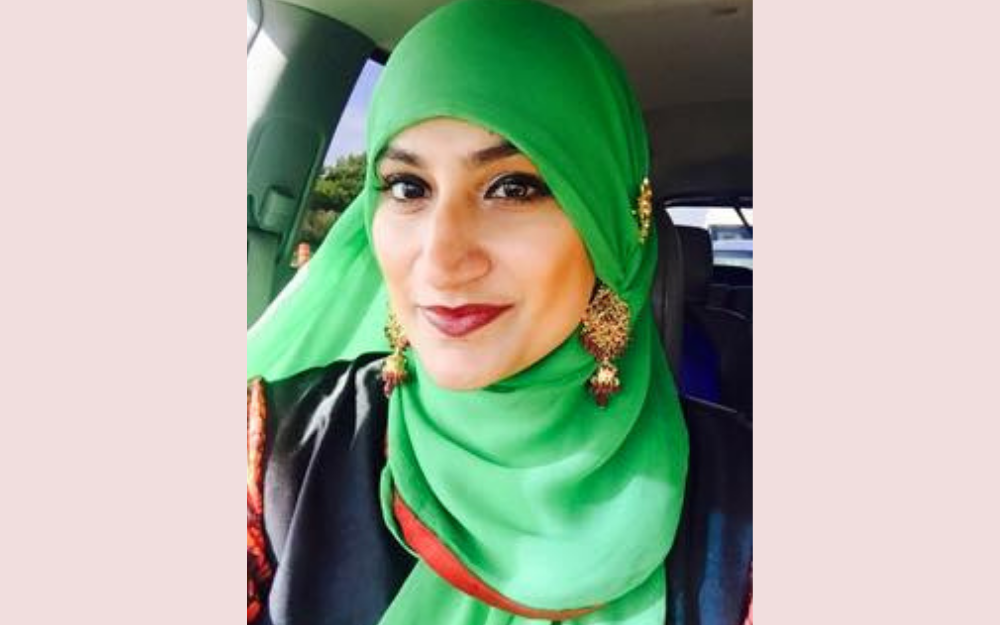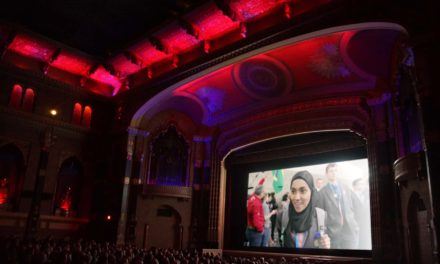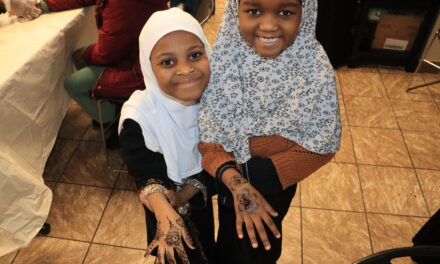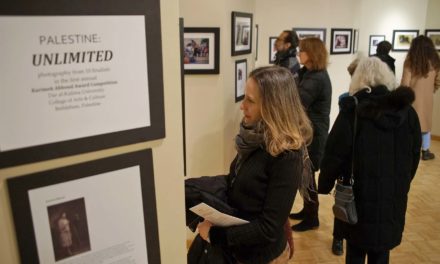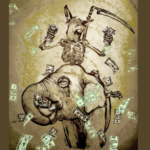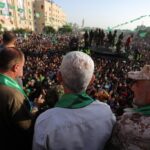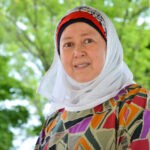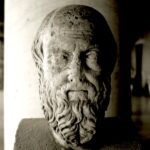Orusa Mozaffar Hassan
Photo Credit
Orusa Mozaffar Hassan
When Brookfield pharmacist Orusa Mozaffar Hassan left her home alone in the early morning of Oct. 19, almost no one knew where she was going.
She was just four days out of a two-week quarantine after one of her four daughters tested positive for coronavirus. “We were super careful. Everyone stayed in a room and if we were ever together, we wore masks,” said Hassan. “When I was bringing food to them, I wore a mask.”
Her husband Mushir knew where she was going. He made sure the children ate breakfast and got on the bus for school. Her older daughters knew. Rayyana, 18, and Nura, 15.
The challenge was to keep the secret from her mother in Chicago. If mom knew, she would have killed me,” she said. “She worries about me and wants me to be safe. I didn’t tell her until I was done.”
That morning Hassan ran the 2020 New York City Marathon. And even though it is her second marathon before she finished the NYC marathon, she did not even admit to herself she is a marathon runner. She had a bit of imposter’s syndrome after the first one in 2018.
Now, with full confidence in herself, she is ready to go public and use her running to benefit good causes.
An offer she couldn’t refuse
In 2018, Hassan ran what she called at the time “probably her only full marathon,” the Lakefront Marathon in Milwaukee. After she finished, she told her mother, “I’m done, and I thought I had really retired.
“It takes so much training. For three or four months, I was putting in about 100 miles a month. You’re out of bed at 5 or 5:30 a.m. and you just run for hours, five or six days a week. I’m glad I did it but I don’t know if I would have that time again. Life changes. Last year I went back to work full-time. And now there is COVID,” she said in an interview about exercise in August.
Then she heard the 2020 New York City Marathon would be a virtual race. Entrants would have between Oct. 17 and Nov. 1 to complete their 26.2-mile run, which could be done from anywhere in the world.
“The opportunity really came out of nowhere and I just really had to jump on it,” Hassan said. “It is one of the iconic races in America. There is the Boston Marathon and this one. You have to qualify for the Boston Marathon and I would never make it. It is for extremely fast runners.

Orusa Mozaffar Hassan will soon add her New York City Marathon medal to her collection of long-distance running medals
“And for the New York City Marathon, participants are chosen by lottery. It is not something I ever thought I would do. When this came up, that you could do it from home and you are going to get the same medal they give out in New York, I just couldn’t pass it up. It was so amazing; I got so excited.”
Race Day
It was cold when Hassan started her run at 7 a.m. on Monday, Oct. 19. “Your body warms up pretty fast but not your extremities. Your fingers and toes never really adapt.”
Hassan took her jacket off at Mile 3 and hid it in the bushes, but kept her gloves on the entire run.
She ran the entire 26. 2 miles by herself. “I have friends who did it together but I don’t like the pressure of keeping up with others. I always train by myself.”
As she ran, she listened to the NYC marathon app. “The app is excellent. They are encouraging you and cheering you on the whole time,” she said. “You’re at Mile 3! You did it; you made it to Mile 6!”
At Mile 21, “I literally I was dying,” Hassan said. “It was really, really hard. Now, I remembered why I was never going to do this again.” She pushed through.
Still, the finish was anticlimactic, she said. Hassan crossed the finish line around 1 p.m., but nobody was around to take her photo and note her time.
For her, it is not about the time; it is all about finishing. “Elite athletes finish it in two hours. It took me six. Sometimes I have to walk.
“The whole thing that keeps you going is that you get a medal at the end. Even when you are exhausted, you are not going to stop because once – you have gotten so far and, two, you get a medal at the end. That is really the reason people do it.
“I didn’t even post anything because I don’t even have any pictures to post. There is nothing. No crowds and there’s no medal. The medal is coming in the mail.”
When she returned home, no one was around. Only the app was cheering, “You did it!”
But soon it was her time to be surprised. Rayyana, 18, and Nura, 15, had flowers for mom. “It was a huge deal for me. I am drying and saving them,” said Hassan.
For the next 24 hours, “I couldn’t move,” said Hassan. “I was very, very sore for a couple of days. But it was a good sore.
“You’re not really hungry either. I had a banana. Your appetite is gone. You have to be hydrated, so I kept drinking water.”
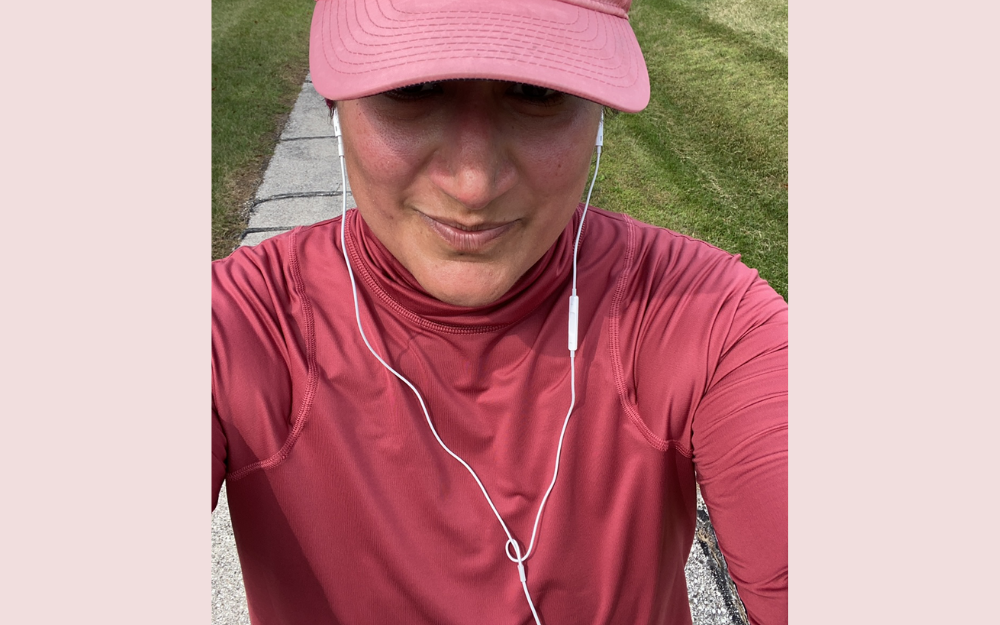
Orusa sends a selfie from Mile 14 of the New York City Marathon.
Now or Never
Hassan’s journey to becoming a marathon runner started when she was 12.
“My parents purchased an exercise bike. I would use the bike for 20 minutes to half an hour,” she said. From then on, she tried “every exercise that came up.”
And when Hassan heard a trainer at the gym takes a group of women every year to walk a half marathon, she thought, “I’ll try it.” She and two friends, all women in their mid-thirties, joined the program. “We trained all through the winter, strictly walking. Then we went to New York and did the half. It was a lot of fun!”
She got into run-walking and, with a few friends, joined a program at PRO (Performance Running Outfitters), a running store in Brookfield that trains people to run half-marathons.
“Once you get into that, it is a different culture,” she said. “It is so mentally uplifting and it becomes a whole part of your life.
“It took a good 10 years of doing training and half marathons before I did a full marathon,” she said. “You know when you turn 40, little things start happening. I got planters fasciitis, a really painful foot condition. So, I thought, I don’t know what the next few years hold.
“My first month, I was in so much pain, but you don’t know if you’ll be in pain the next year. Look, the pandemic came and all these races were canceled.
“It’s either now or never. That’s how I have always done everything. You have to jump into it and take the opportunity. I feel that about everything. When I took the role of president of the masjid in 2017, I had the same approach.
Becoming a marathon runner
After finishing her second marathon, Hassan said, “I feel stronger. After the first one, ok, you’re a marathon runner, but I don’t know if I believed it.
“Now I believe it. If I’m going through anything hard, I think to myself, “I am a marathon runner. I can get through this.”
And now that Hassan is secure in calling herself a “marathon runner,” she is thinking about how to use this role for the good.
“I have different ideas in mind. We really put a lot of miles in,” she said. “When I trained for my first marathon, I did 100 miles in one month. This time I did 50 miles in one month. So, I feel like maybe I could do something like showcase different organizations I donate to. If I have a shirt for those organizations and wear it when I run, I can take a picture, and encourage others to donate, too. We really put so much time into running and it would just be nice if I can do something with it.”
Hassan said it would be nice to dedicate her “future 5Ks” to different organizations.
Not marathons? she was asked. “I’m not planning on it,” she answered. “But if a really exciting race comes up, I’ll do it.
“I would like to be done with marathons, but I don’t know if I am. The only thing I haven’t done that would probably be really fun for me is the Chicago Marathon. I’ve never done anything in Chicago and that is where I’m from.
“Maybe that is something I would do in the future, but I don’t have any plans.”
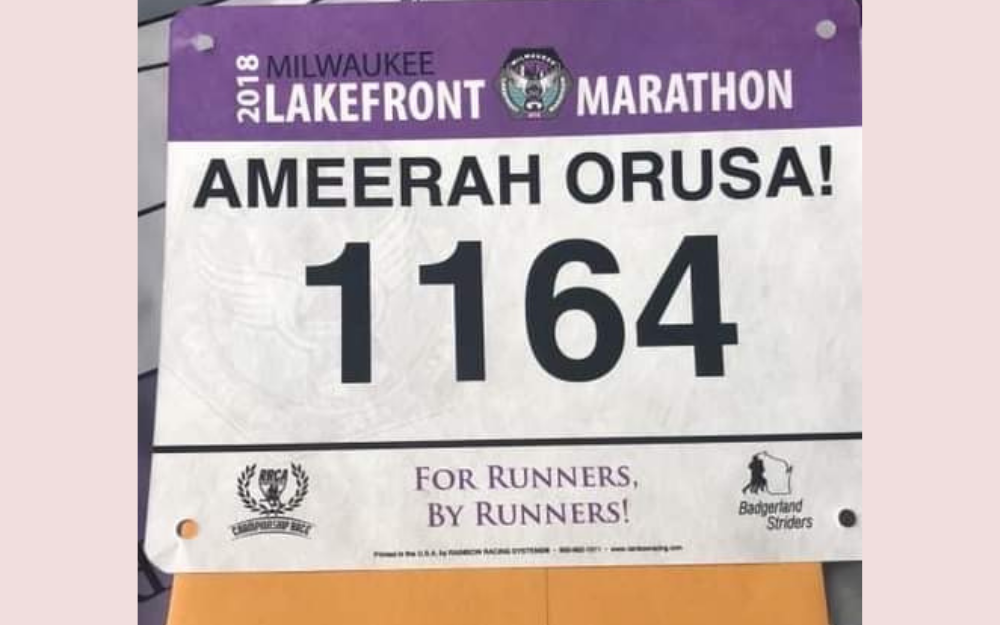
Orusa’s number in the 2018 Milwaukee Lakefront Marathon.
